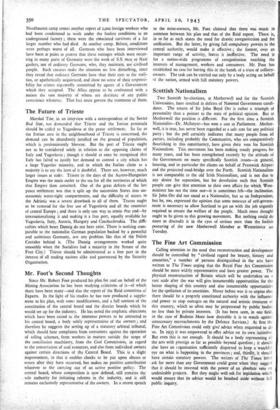The Fine Art Commission
Calling attention to the need that reconstruction and development should be controlled by " civilised regard for beauty, history and
amenities," a number of persons distinguished in the arts have written to The Times urging that the Royal .Fine Art Commission should be more widely representative and have greater power. The physical reconstruction of Britain which will be undertaken on a vast scale after the war will give innumerable opportunities for the better shaping of this country and also innumerable opportunities for the spoliation of its amenities. Never before was it so urgent .that there should be a properly constituted authority with the influence and power to stop outrages on the natural and artistic treasures of this country, which so often may be perpetrated by public bodies no less than by private interests. (It has been seen, in one field, in. the case of Bodmin Moor how desirable it is to watch against unnecessary encroachments by the Defence Services.) At first the Fine Art Commission could only give' advice when requested to do so. In 5933 it was empowered to offer advice on its own initiative. But even this is not enough. It should be a body representing all the arts with ptestige as far as possible beyond question ; it should also have an crganisation sufficiently dispersed to keep a watchful eye on what is happening in the provinces; and, thirdly, it should have certain statutory powers. The writers of The Times letter ask for more than any Government could grant when they suggest that it should be invested with the power of an absolute veto on undesirable projects. But they might well ask for legislation- which would ensure that its advice would be brushed aside without full public inquiry.


























 Previous page
Previous page